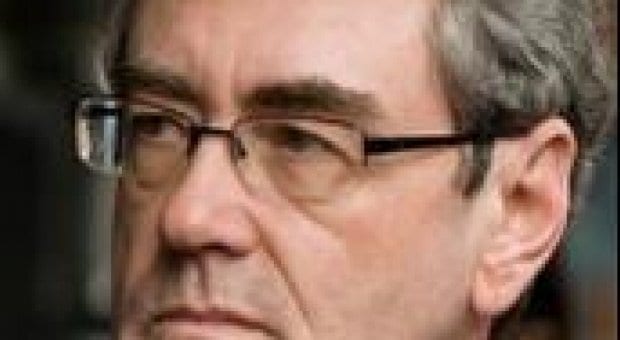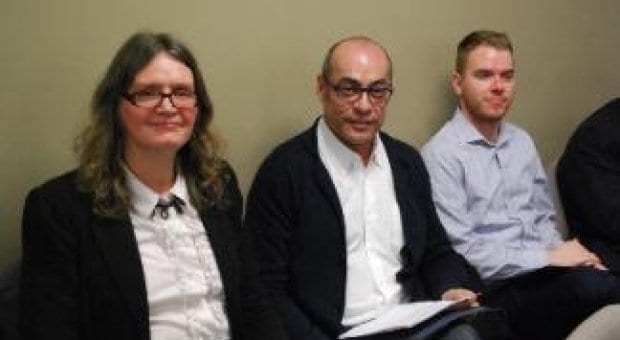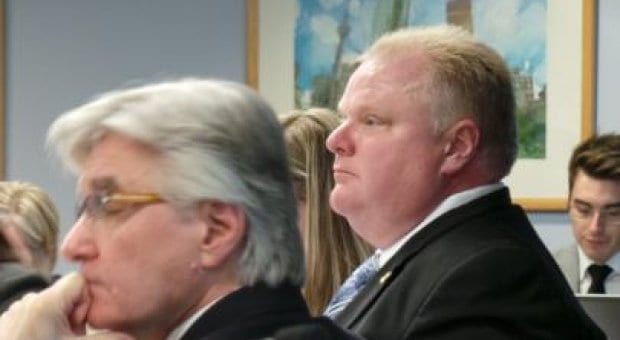
Piers Handling, director and CEO of the Toronto International Film Festival. Credit: Xtra file photo

Members of the Pride Toronto board. from left: Susan Gapka, Francisco Alvarez and Sean Hillier. Credit: Andrea Houston
After several hours of debate April 23, city council’s executive committee voted to defer further discussion of Pride funding and the legalities of banning the words “Israeli apartheid” at city-funded events, ensuring ongoing uncertainty about the future of Pride Toronto’s annual cultural grant.
Early in the day, Councillor Shelley Carroll confirmed to Xtra that Councillor David Shiner plans to ignore the advice of city staff and submit a motion to remove Pride’s cultural grant as a penalty for allowing the group Queers Against Israeli Apartheid (QuAIA) to participate in the Pride parade.
Instead, Shiner later moved a motion to defer the item until the next executive committee meeting, May 28. It would then head to council in June.
This means that Pride — which attracts more than one million people and annually brings tens of millions of dollars into Toronto — won’t know whether it will receive the city’s annual grant of $123,807 until just days before the festival is set to begin.
This is the third year Pride has faced a censorship battle with a small handful of councillors just as planning for the event kicks into high gear.
Meanwhile, three city staff reports once again determined that the use of the term “Israeli apartheid” is not a criminal offence and does not contravene any city policy.
“This was enormously disrespectful to Pride. It is one of the major summer festivals in the city. To be treated this way is just disgraceful,” says QuAIA member Tim McCaskell. “I can only see this treatment as homophobic.”
Councillor Kristyn Wong-Tam suspects that deferring the issue for a month is a “ploy to intimidate and silence” the activists and community groups who spoke. “These councillors already know how they are going to vote. I can’t imagine why they would defer this,” she says. “If deputants spoke to the item today, they will not be able to speak to the item again on May 28.”
Most of the 27 deputants on April 23 spoke in favour of the city manager’s latest recommendations.
“Perhaps what [Councillor James Pasternak and Shiner] are trying to do is mobilize and organize the opposing side,” Wong-Tam says. “We have Councillor Pasternak, who is actively trying to defund Pride, who is actively lobbying councillors to swing his way. So this could be the political strategy he needs to de-fund Pride.”
Pasternak has been leading the crusade to have the phrase “Israeli apartheid” banned; in 2012 he asked the city to withhold Pride’s cultural grant if QuAIA participates in Pride.
“This is grossly unfair,” Wong-Tam says. “We are going into Pride season. The reports were already delayed to give Councillor Pasternak a personal briefing, so it doesn’t make sense that this is happening.”
Holocaust survivor Suzanne Weiss spoke to councillors April 23, asking, “Haven’t we learned anything from the Holocaust?”
“A sweeping ban on disrespectful speech will threaten every citizen’s rights,” she said.
Other deputants, including Anita Bromberg, from B’nai Brith, encouraged councillors to ban the words “Israeli apartheid.” Bromberg spoke about what she called the “core purpose of Pride,” noting that she feels the parade is not a political demonstration. “This is a city-wide celebration. I am deeply offended,” she said.
Filmmaker Elle Flanders, who grew up in Israel and has lived in the West Bank, shared her personal experiences of living as a Jewish lesbian in Ramallah. “There are roads for Jewish Israelis, roads for Palestinians. We made a film about these roads that screened at TIFF in 2011. Yes, a film about the apartheid roads that thousands of people saw at TIFF. You cannot single out Pride, Councillor Pasternak.”
Wong-Tam says a motion to restrict speech would certainly have implications for the city’s other major cultural institutions. QuAIA has also partnered with the Images Festival, which was held at the Art Gallery of Ontario and at the TIFF Bell Lightbox, two of the 10 major cultural organizations that receive City of Toronto money.
Piers Handling, director and CEO of TIFF, was at executive committee April 23 to make a deputation on another item, a proposed tax exemption of $937,000 for the TIFF Bell Lightbox. Handling says TIFF regularly screens controversial films focusing on critical analysis of governments and has previously screened films on the Israeli/Palestinian conflict, including films that use the phrase “Israeli apartheid.”
“As long as something is not hate speech, that’s all we are concerned about, and there are already laws around that,” he told Xtra. “We are very sensitive to that at the film festival . . . The festival is about open dialogue, open conversation and providing new avenues to understand extremely complicated situations, and we are fully in favour of that.
“We also feel the citizens of Toronto are in favour of that as well. So as long as it is not hate speech, we will always support free speech.”
Handling says the city’s rules should be applied evenly to all the major cultural institutions. “We will certainly look at how that would affect TIFF,” he says of the upcoming executive council vote. “We obviously want to talk to Councillor Shiner and some of the other city councillors about what the intent of their motion would be, and hopefully it will not pass. I hope good sense will prevail.”
Wong-Tam says council’s executive committee could have taken the opportunity to ask Handling about the festival’s programming. “Today was a clear and blatant example of how Pride is being singled out. That was insulting to the gay community.”
Pride board member Susan Gapka waited all day at city hall for a decision. She says councillors had endless praise for TIFF’s economic impact and cultural importance to Toronto. “I couldn’t help but notice the different points of view of one cultural festival opposed to the other,” she says. “We have a month now to express to council why it’s important the city abide by the Ontario Human Rights Code.”
Pride executive director Kevin Beaulieu says the queer community is no stranger to censorship and oppression. “In any discussion of arts and culture, freedom of speech and expression are very important, even if that speech may make people uncomfortable.”
Wong-Tam is urging the queer community to “come out in full force” on May 28 to stand with Pride. “Come to executive, take up space and watch them try to defund Pride. Our community should use this time to mobilize as well.
“Toronto is about to host the largest LGBT event in human history in 2014 and this is how the city treats Pride Toronto? It’s shameful.”
Doug Kerr was one of the organizers of Proud of Toronto, a coalition of several community groups and individual activists that mobilized in the face of threats to defund Pride in 2011. Proud of Toronto hosted a game-changing rally in the city hall rotunda to generate support for Pride.
“What Pasternak is doing now is throwing Pride under the bus at a time when it really needs support, and that’s really damaging the organization at a time it needs the city behind it,” he says. “What a horrible and embarrassing message to send. When we are trying to get ready for WorldPride, the city is pulling funding? It doesn’t make any sense.”
Kerr is also co-chair of the WorldPride Human Rights Conference 2014 organizing committee and wonders what implication the motion could have on the festival next year. If anything, he says, the city should be giving more money to Pride to ensure the event is a success.
“I suspect the queer community will rally around Pride over this,” he says. “[But] we need the entire Toronto community.”

 Why you can trust Xtra
Why you can trust Xtra


